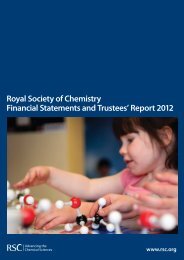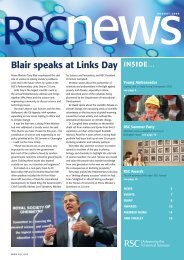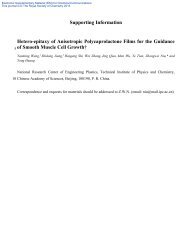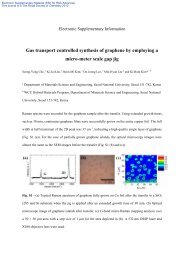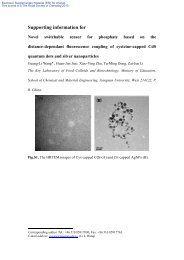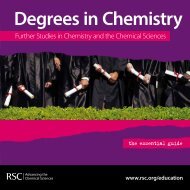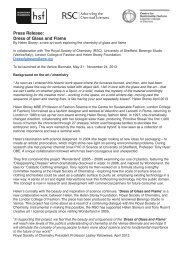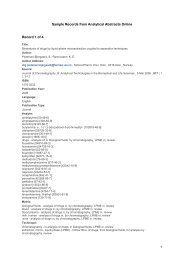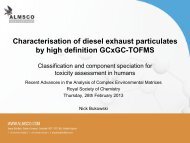Reactions Issue 1 - Royal Society of Chemistry
Reactions Issue 1 - Royal Society of Chemistry
Reactions Issue 1 - Royal Society of Chemistry
You also want an ePaper? Increase the reach of your titles
YUMPU automatically turns print PDFs into web optimized ePapers that Google loves.
<strong>Reactions</strong><br />
<strong>Issue</strong><br />
1 | April 2007<br />
Welcome to the first edition <strong>of</strong> <strong>Reactions</strong>, the newsletter that tells you all<br />
about <strong>Chemistry</strong> for our Future. This two-year £3.6m pilot programme,<br />
financed by the Higher Education Funding Council for England,<br />
is designed to ensure a strong future for chemical science higher<br />
education.<br />
<strong>Chemistry</strong> for our Future began on 1st September 2006. This newsletter introduces you to our<br />
programme activities, which cover the following areas:<br />
• Outreach - demonstrates the excitement <strong>of</strong> chemical sciences and career opportunities available<br />
to school and college students through the project <strong>Chemistry</strong>: The Next Generation<br />
• e-mentoring – will overcome the challenges <strong>of</strong> traditional face-to-face mentoring through an<br />
innovative scheme<br />
• Teacher and academic fellowships – a scheme that enhances understanding between school<br />
and university chemistry and smoothes the transition to higher education<br />
• Higher education curriculum development – improving the diversity <strong>of</strong> provision, teaching<br />
methods and content <strong>of</strong> degree courses<br />
• Smarter use <strong>of</strong> higher education laboratories - exploring the use <strong>of</strong> university facilities with local<br />
schools and colleges<br />
• Careers – a review <strong>of</strong> careers advice for school and college students, incorporating new resources<br />
In this issue<br />
Universities open their<br />
cutting edge labs to<br />
schools 2<br />
E-mentoring for future<br />
scientists 3<br />
Bridging the gap between<br />
school and university 3<br />
Inspiring the next<br />
generation <strong>of</strong> chemists 4<br />
<strong>Reactions</strong> will be published biannually and will keep you up-to-date with programme developments<br />
and forthcoming events. Your input will be welcome and if there’s anything you’d like to see covered<br />
in the newsletter, please contact Josephine Tunney at tunneyj@rsc.org.<br />
Meet the team<br />
The <strong>Chemistry</strong> for our Future project management team is based at the RSC in Burlington House, London.<br />
Josephine Tunney, National Programme Manager<br />
Jo has managed a wide range <strong>of</strong> projects that<br />
support chemical science higher education<br />
since she joined the RSC in April 2004 and is<br />
now responsible for overall management <strong>of</strong><br />
<strong>Chemistry</strong> for our Future.<br />
tunneyj@rsc.org | +44 (0)207 440 3348<br />
Elizabeth O’Donnell, Project Officer<br />
Elizabeth recently joined the RSC after<br />
finishing her PhD at the University <strong>of</strong><br />
Strathclyde. She’s involved with all aspects<br />
<strong>of</strong> the programme and manages the<br />
e-mentoring and fellowship schemes.<br />
odonnelle@rsc.org | +44 (0)207 440 3366<br />
Kate Burrell, <strong>Chemistry</strong>: The Next Generation National Manager<br />
Kate has been managing the outreach project<br />
<strong>Chemistry</strong>: The Next Generation since it began<br />
in November 2004 and continues to do so<br />
now it’s an integral part <strong>of</strong> <strong>Chemistry</strong> for our<br />
Future. She taught secondary school science<br />
and has a background in biochemistry.<br />
burrellk@rsc.org | +44 (0)207 440 3330<br />
Nathalie Durili, Administration Assistant<br />
Nathalie worked in the City as an administrator<br />
before joining the RSC in 2005. Her many<br />
responsibilities include managing promotional<br />
materials, organising conferences and keeping<br />
the website up to date. She’s also studying<br />
part-time for a BA in French Studies.<br />
durilin@rsc.org | +44 (0)207 440 3351
2 | <strong>Issue</strong> 1 | April 2007<br />
Schools experiment in cutting edge style<br />
School students in Yorkshire and the South<br />
West will soon enjoy practical chemistry in<br />
cutting-edge university laboratory facilities<br />
instead <strong>of</strong> school. Thanks to projects<br />
funded through <strong>Chemistry</strong> for our Future,<br />
the Universities <strong>of</strong> Sheffield and Bristol are<br />
exploring how they can widen access to their<br />
teaching facilities. A purpose-built schools lab<br />
will be available year-round at Sheffield, while<br />
at Bristol facilities will be <strong>of</strong>fered during the<br />
traditional university downtime <strong>of</strong> Wednesday<br />
afternoons and exam periods.<br />
<strong>Chemistry</strong> for our Future funding is being<br />
used to build the lab at Sheffield which will<br />
be used solely by schools and teachers. Due<br />
to be launched in September, about 1,500<br />
students are expected to use it annually. It<br />
will be available to schools as an open-access,<br />
free resource which can be used in a normal<br />
teaching capacity. Teachers can alternatively<br />
take advantage <strong>of</strong> a series <strong>of</strong> pre-packaged<br />
experiments designed, checked and packaged<br />
by the lab’s dedicated technician – all <strong>of</strong> which<br />
will be relevant to the current A and AS Levels.<br />
Installation <strong>of</strong> the lab begins this month and<br />
local schools will trial the facilities in June and<br />
July.<br />
Simon Jones, Senior Lecturer in Organic<br />
<strong>Chemistry</strong> at Sheffield, is leading the project.<br />
He said: “The new lab will have a double<br />
impact – students will be able to experience<br />
the excitement and fun <strong>of</strong> practical chemistry,<br />
whilst teachers will improve their confidence<br />
<strong>of</strong> teaching experimental science.”<br />
“We’re really hoping schools will come back a<br />
School students enjoying practical chemistry at the University <strong>of</strong> Bristol<br />
second or third time so the students get a chance to meet undergraduates and postgraduates,<br />
and get a good idea <strong>of</strong> what studying chemistry at university is like.”<br />
Meanwhile, at the University <strong>of</strong> Bristol, a coordinated programme <strong>of</strong> curriculum-based practical<br />
activities will be <strong>of</strong>fered to local schools at the £18m teaching laboratories, Bristol ChemLabS,<br />
which opened in February. Funded by HEFCE, with a large capital investment from the<br />
university, the facilities will be amongst the best in the country for teaching practical chemistry.<br />
Activities designed in consultation with local teachers and science advisors will include:<br />
• Two-day taster sessions for year 11 students who have just completed their GCSEs<br />
• A suite <strong>of</strong> experiments for Key Stage 4, AS and A2 level students<br />
• Revision workshops for GCSE students focussing on structure and bonding, energy and<br />
organic chemistry<br />
• Research opportunities for students performing extended A level projects<br />
Trials <strong>of</strong> all the activities will take place with a small number <strong>of</strong> partner schools over the next few<br />
months. The full programme <strong>of</strong> events will be launched in September.<br />
Meeting the needs <strong>of</strong> learners<br />
<strong>Chemistry</strong> for our Future provides a unique, timely opportunity to review higher education chemical<br />
science courses as secondary level teaching undergoes widespread changes. A new range <strong>of</strong><br />
science GCSEs was introduced recently and revised A Level chemistry specifications will follow next<br />
year. Universities need to take these changes into account to make sure that their courses appeal to<br />
prospective students and meet their needs and expectations.<br />
Four curriculum development themes are being explored through <strong>Chemistry</strong> for our Future:<br />
1 Improving the school to university transition<br />
2 Introduction and evaluation <strong>of</strong> context and problem based learning<br />
3 Greater access through distance learning<br />
4 Maximising the benefits <strong>of</strong> European reform<br />
Read about one <strong>of</strong> the new school to university transition projects on page 3.
April 2007 | <strong>Issue</strong> 1 | 3<br />
Boot-camps give a head start<br />
An innovative scheme to improve the practical skills <strong>of</strong> new<br />
undergraduates is being developed at the University <strong>of</strong> Manchester.<br />
Chemical boot-camps will give students the opportunity to take<br />
part in an intensive practical course before they begin their degree.<br />
Academics Sarah Heath and Garry Procter came up with the idea<br />
in response to concerns about the practical skills and confidence<br />
<strong>of</strong> first year undergraduates. A decline in the amount <strong>of</strong> practical<br />
chemistry taught in schools has resulted from poor facilities and<br />
health and safety issues, inevitably leading to problems when<br />
students arrive at university.<br />
“Many students find undergraduate labs very daunting” says Heath.<br />
“Not knowing what’s going on, not having the confidence to use<br />
equipment, and not understanding what’s expected <strong>of</strong> you can be<br />
very unsettling.”<br />
The course will last up to a week and aims to equip students with<br />
the essential skills needed for practical chemistry, such as an ability<br />
to assemble glassware, record infra-red spectra, perform molar<br />
calculations and assess hazards. Heath explains: “It’s all about the<br />
basics – being able to read through a practical script, understand<br />
what you’re being asked to do, perform the experiment and record<br />
the results.”<br />
“We’re really hoping to be able to boost the students’ confidence so<br />
they can hit the ground running when they start their degree.”<br />
Procter and Heath, funded by <strong>Chemistry</strong> for our Future, are<br />
developing a full programme <strong>of</strong> experiments for the intensive<br />
practical course, complete with detailed demonstrator and<br />
technician notes. The experiments will be tested by undergraduates<br />
and local school children before the prototype course is launched<br />
later this year.<br />
For more information, please visit www.rsc.org/cf<strong>of</strong>.<br />
Blog an e-mentor!<br />
This month sees the launch <strong>of</strong> Future Blogs, an innovative<br />
e-mentoring scheme which will help guide secondary school<br />
students through their educational and career choices. The scheme<br />
has been developed with the Brightside Trust and builds upon<br />
the success <strong>of</strong> a similar e-mentoring scheme available to students<br />
interested in studying medicine and healthcare subjects.<br />
Future Blogs allows mentors and students to keep in touch through<br />
a web-based service, removing the constraints associated with<br />
traditional face-to-face mentoring, and the need to travel.<br />
Twelve universities across England, each linked to three schools, will<br />
provide undergraduate and postgraduate mentors. Insight into a<br />
wide range <strong>of</strong> employment areas will come from 50 pr<strong>of</strong>essional<br />
chemical science mentors.<br />
Mentoring via the Future Blogs website will provide:<br />
• Weblog-style journals for easy communication<br />
• Tailored prompts and news articles to stimulate and focus<br />
discussion<br />
• An extensive resource library<br />
• Online mentor training<br />
• Discussion forums for mentors and project coordinators<br />
• Support with project implementation, training and technical<br />
issues<br />
The website is available at www.futureblogs.org. For more<br />
information on the scheme, or to suggest news articles for the<br />
website, please contact Elizabeth O’Donnell at odonnelle@rsc.org.<br />
Date for your diary<br />
National <strong>Chemistry</strong> for our Future Conference 3 July 2007, Aston Business School
4 | <strong>Issue</strong> 1 | April 2007<br />
Hands-on chemistry is the winning formula<br />
per cent <strong>of</strong> the students who’ve attended our<br />
outreach events say they’re now more likely to<br />
consider studying chemistry at university.”<br />
The collaboration which has made the events<br />
possible has been another success story.<br />
<strong>Chemistry</strong>: The Next Generation has brought<br />
together expertise in universities and industry<br />
to <strong>of</strong>fer students an exciting menu <strong>of</strong> activities<br />
including:<br />
Cool chemistry inspiring students<br />
Harry Potter style chemistry, liquid crystal production and solar cell design are some <strong>of</strong> the<br />
hands-on activities <strong>of</strong>fered through an outreach project which gives school students an<br />
enthusiasm for chemistry.<br />
<strong>Chemistry</strong>: The Next Generation has proved so successful in an initial pilot in the East Midlands,<br />
North West and London that it’s now being rolled out to thousands more school students in the<br />
South East, Yorkshire and Humber and the North East.<br />
The outreach project showcases the excitement <strong>of</strong> chemical science and the advantages <strong>of</strong><br />
going to university. It targets school students who may not otherwise consider a degree course.<br />
University and further education collaboration with industry gives students the chance to<br />
experience hands-on chemistry.<br />
In the pilot project involving more than 19,000 young people, school children visited universities<br />
and industrial sites. They took part in activities involving state <strong>of</strong> the art equipment and learned<br />
about careers in chemistry.<br />
Kate Burrell, National Manager <strong>of</strong> the project, believes the opportunity to get involved with<br />
hands-on activities is key to the success <strong>of</strong> the outreach events: “Practical chemistry is what<br />
brings the subject to life and fires enthusiasm.<br />
“Activities such as ‘Hands free and hands on’ where students get to learn about the chemistry<br />
<strong>of</strong> mobile phones, make liquid crystals and design solar cells have been a real hit. Around 40<br />
• Magical chemical energy – chemistry<br />
Harry Potter style<br />
• Food for thought – isolating DNA from<br />
kiwi fruit<br />
• Plastic milk – transforming milk protein<br />
into fridge magnets<br />
• Murder in the lab – whodunit?<br />
• The Jelly Baby sacrifice – exploring the<br />
energy <strong>of</strong> sugars<br />
• <strong>Chemistry</strong> careers fair – showcasing the<br />
opportunities available<br />
Events are organised on a regional basis by<br />
a team <strong>of</strong> six coordinators who are based in<br />
universities. They act as a central point <strong>of</strong><br />
contact for schools, academics and industrial<br />
partners and work with other organisations<br />
seeking to raise the aspirations <strong>of</strong> young<br />
people such as Aimhigher, Science Learning<br />
Centres, Education Business Partnerships and<br />
the Science, Engineering, Technology and<br />
Mathematics Network.<br />
Information on all our project partners and<br />
forthcoming events can be found on our<br />
website at www.rsc.org/cf<strong>of</strong>. We’re always<br />
interested to hear from anyone who has<br />
ideas for future activities or who’d like to<br />
get involved with organising events. Please<br />
contact Kate Burrell at burrellk@rsc.org.<br />
Contact us<br />
<strong>Royal</strong> <strong>Society</strong> <strong>of</strong> <strong>Chemistry</strong><br />
Burlington House<br />
Piccadilly<br />
London W1J 0BA<br />
Tel: +44 (0)20 7440 3344<br />
Fax: +44 (0)20 7287 9825<br />
Registered Charity Number 207890<br />
Regional Coordinators<br />
East Midlands<br />
Liz Blackshaw<br />
University <strong>of</strong> Leicester<br />
emb23@le.ac.uk<br />
North West<br />
Jenny Faulkner,<br />
University <strong>of</strong> Manchester<br />
jennifer.faulkner@manchester.ac.uk<br />
Yorkshire and Humberside<br />
Rukhsana Rahim,<br />
University <strong>of</strong> Huddersfield<br />
r.rahim@hud.ac.uk<br />
London<br />
Jayne Shaw,<br />
University College London<br />
aimhigherchemistrylondon@ucl.ac.uk<br />
North East<br />
Kevin Carr,<br />
University <strong>of</strong> Sunderland<br />
kevin.carr@sunderland.ac.uk<br />
South East<br />
Jennifer Hider,<br />
University <strong>of</strong> Surrey<br />
j.hider@surrey.ac.uk



